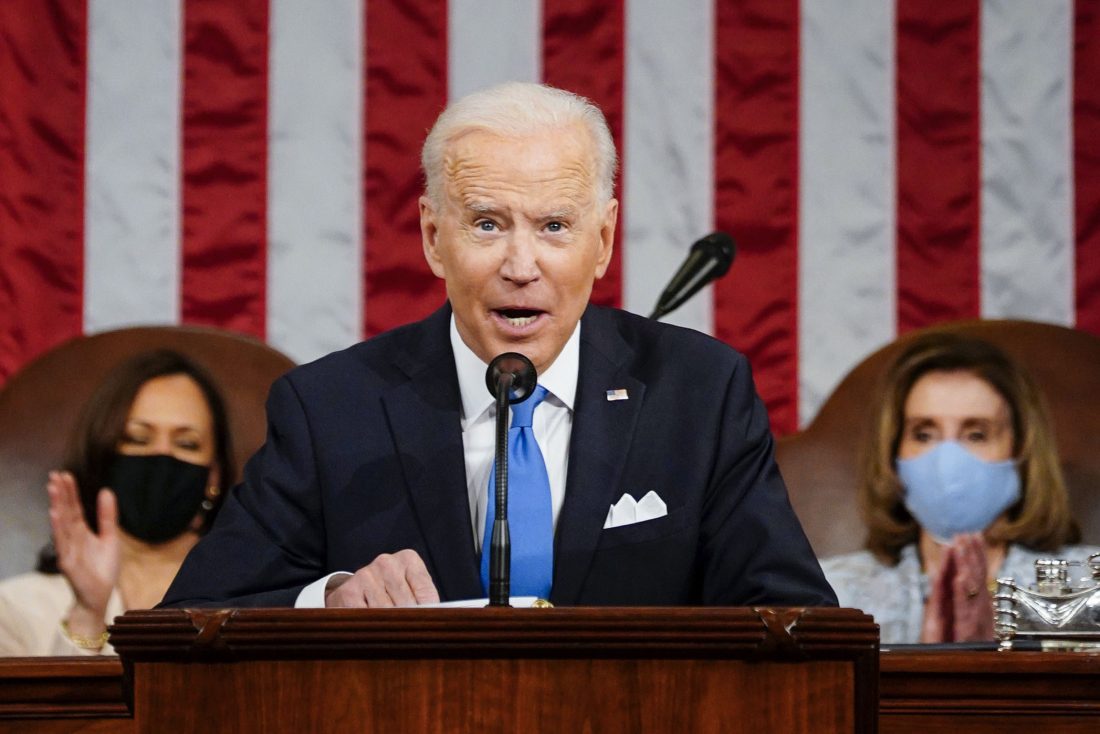Biden’s corporate tax plan takes aim at income inequality

ap photo President Joe Biden addresses a joint session of Congress, Wednesday in the House Chamber at the U.S. Capitol in Washington, as Vice President Kamala Harris, left, and House Speaker Nancy Pelosi of Calif., applaud.
WASHINGTON — From John Kennedy to Ronald Reagan to Donald Trump, American presidents have taken aim at corporate America’s tax-avoidance schemes before — and mostly missed.
Now, President Joe Biden is training the government’s sights again on the loopholes, shelters and international havens that have long allowed multinational companies to dodge taxes in ways that ordinary households cannot.
The idea is twofold: First, to help pay for Biden’s trillions in proposed spending — for everything from roads and bridges and green energy to internet access, job training, preschool and sick leave. And second, to shift more of the federal tax load onto companies and narrow America’s vast income inequality. Affluent investors reap the biggest windfalls when after-tax corporate profits accelerate.
“The burden,” said Thornton Matheson, senior fellow at the Tax Policy Center, would “fall predominately on wealthier individuals.”
Biden, in effect, wants to swing the pendulum back. At one time — the early-to-mid-1950s — corporations accounted for 30 percent of federal tax collections. Last year, their share barely topped 7 percent.
As corporations have generated an ever-smaller share of federal tax revenue, the burden has fallen more heavily on individuals, through the income tax and the levies that pay for Social Security and Medicare.
The president wants to stop companies from stashing profits in countries with low tax rates. To do so, he’s proposed a 21 percent minimum tax on multinationals’ foreign earnings and is urging other countries to follow suit. His plan would also rescind what the administration sees as international loopholes in Trump’s 2017 tax legislation.
To strengthen its ability to root out tax cheating, the administration has proposed adding $80 billion to the IRS budget over a decade to bolster the agency’s underfunded enforcement team. As part of his effort to reduce America’s wealth gap, he’s also proposed raising the tax rate on long-term capital gains for Americans who earn over $1 million a year.
Many analysts see Biden’s corporate tax plan as a gamechanger — if Congress embraces it.
If adopted, the 21 percent minimum global tax “effectively spells the end of the tax haven as we have come to know it,” said Alexander Arnon, an analyst at the nonpartisan Penn Wharton Budget Model, a research organization associated with the University of Pennsylvania.
Penn Wharton’s analysts estimate that a 21 percent minimum global tax and other international provisions of Biden’s tax plan would raise $987 billion from 2022 through 2031 — nearly half as much as Biden’s overall corporate tax plan would produce.


